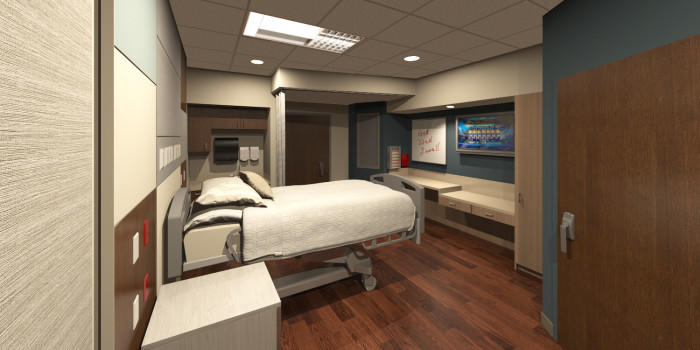When the new Baptist Health Medical Center-Conway (BHMC-Conway) opens next spring, it will debut with more advanced capabilities to integrate daily patient care with technology than any other hospital in the state.
As with all Baptist Health hospitals, BHMC-Conway will offer leading-edge technology, but it is also being designed in new ways that will especially benefit patient needs at the bedside and the nurses taking care of them.
“We’re not just building a beautiful facility that houses beds and patients,” said David House, Baptist Health’s vice president of Information Services and chief information officer. “We’re creating a model that will be built to function as a care-delivery facility fully integrated with technology.”
“This building will have technology in it that aids in the healing process in ways we have not applied before so that we will have a physical building that enhances the care-delivery infrastructure with some elements the patient will see and some that the patient won’t see,” House said.
A prime example of new technology that is going to make a difference at BHMC-Conway is smart beds that will be installed in all patient rooms.
Traditional patient beds are now becoming an endpoint on an information technology network that is integrated to a clinical system – an integration that is blurring the lines of ways technology is used in modern hospitals.
“The one thing we know about inpatients is that they’re going to spend some time in bed, so probably one of the most important care-delivery tools we have is to have a fantastic bed. You can look at a bed as a place to lie down and a place to sleep, or you can look at a bed as something that can actually help in your treatment of care,” House said.
The smart beds will have many practical features that will make it easier for caregivers to monitor conditions and accomplish such tasks as weigh patients without moving them to a scale — and constantly monitor the weight as part of the patient’s electronic health record.
Recording and monitoring weight, for example, is critical for patients with conditions such as congestive heart failure who must have their weight constantly monitored to determine if fluid is building up in the body.
“What makes smart beds so powerful is not that they can weigh a patient and all those kinds of things, but that information also flows back into Epic. So it keeps our nurses from having to document that and we can look into trends into a patient’s weight and adjust medication,” House said.
“Think about every time you have to weigh, you have to get the patient out of bed and stand on a scale, and at some point you might not weigh them as often just because of what you’re going to put them through to weigh them,” he said.
“So the cool thing about the beds is not just their stand alone power, but what really makes them slick is their integration with Epic,” House said.
House and a team from Baptist Health visited Texas Health Resource Hospital in Fort Worth on a fact-finding mission as they were looking at new technology for the Conway hospital, and the staff at that hospital said one particular component has been a major home run for patients and nurses.
“When we were down there, I asked them to tell me what has been the home-run feature for patient rooms, and they said, ‘Oh, that’s easy – being able to change the thermostat from the bed,’” House said.
“At first, I said you’ve got to be kidding. But think about it. You’re lying in the hospital, and you’re hot, but the thermostat is over there on the wall. So you hit the call button and they send a nurse down. The nurse shows up and turns it down. Thirty minutes later you’re cold and you hit the nurse call again,” said House.
“Just imagine that in every room. So what you’ve done is you’ve taken this highly trained person who is there to exercise clinical judgment and deliver quality patient care and you’ve turned them into a human thermostat,” he said.
Another feature at the Conway hospital will be exterior electronic room signage that will be connected to the Epic system and show not only the patient’s name but important facts such as whether that patient is a fall risk and other information that can be continuously updated and displayed.
Baptist Health is building an Epic integration lab in a space at the Southwest campus that will have a prototype of the patient rooms in Conway so that the new technology can be tested.
The Conway hospital rooms may also have a more expansive entertainment package in a partnership with that city’s cable television provider in an effort to offer more “distractive technology” to patients.
“If you’re lying in bed not feeling good, sometimes that TV can be a great distractor to give your mind something else to focus on,” House said.
Additionally, some of the other technology new to the Baptist Health system that is being evaluated for the Conway hospital includes lighting controls for the patient from the bed, Epic’s Radiant Radiology and OpTime Operating Room systems, Epic MyChart Bedside patient facing for a wealth of medical information, room service from MyChart to DFM/Computrition, consumer charging stations, Hill-Rom smart-bed displays at the nurse station, and in-room white-board wiring.
If the new technology in patient rooms at BHMC-Conway proves to be successful, it could pave the way for other hospitals in the Baptist Health system to see upgrades in the near future.
“We don’t get a blank canvas very often so my projection is that some of the things we will try we’ll see great value of and spread them and some will be more limited and used as research and development to see what we learn from them,” House said.

